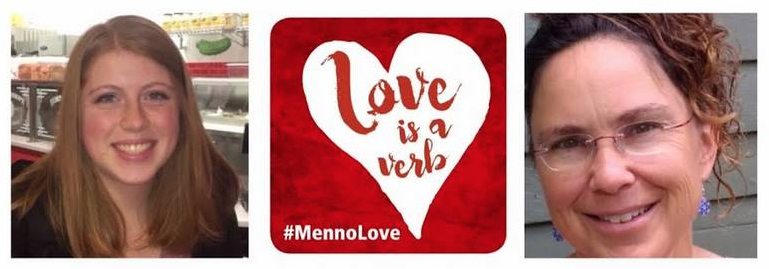Glimpses of Healing and Hope

July 10, 2017
By: Jane Bishop Halteman
Six Kern Road high school youth, their sponsors Lane and Cathy, and three congregational delegates, Dave, Jim, and Vicki, plus Mark and Judy, attended Mennonite Church USA convention July 4-8 in Orlando.
Some of the 13 KRMC attendees will share their responses to MennoCon17 next week during Sunday worship. In the meantime, a summary of what took place at the event follows, based on daily convention newsletters and reports from denominational news outlets.
A what-to-expect-first-day-of-convention briefing advised attendees that Mennonite Women USA and Mennonite Men would host a prayer walk to kick off Orlando 2017 Tuesday evening, July 4. “Take this opportunity to start convention with a relaxing time of walking and praying. Join us as we bless convention, the city of Orlando, and Mennonite Church USA.”
Convention music, prayer, ritual, conversation, and speakers explored the theme Love Is a Verb. The convention newsletter, Orlando Squeeze, posted Tuesday, Wednesday, Thursday, and Friday recaps of events here, including Servant Project highlights, a story celebrating 100 years of Mennonite Women USA, and an article about an inclusive worship service honoring victims of the 2016 shooting at the Pulse nightclub in Orlando, among many other reports. The official 96-page program book, offering youth and adult seminar topics, at-a-glance daily calendars, featured speakers, and special events, appears here.
Speaking in the Thursday morning adult worship service, best-selling New York Times author and popular blogger Rachel Held Evans suggested that “responding in love isn’t about being nice or respectable, but is instead a matter of turning over tables: creating homes for refugees, bringing casseroles, marching with Black Lives Matter, and planting gardens in ‘urban deserts,’” according to a Mennonite World Review (MWR) article.
MWR also reported that “Mennonite Church USA delegates on July 6 overwhelmingly passed a resolution on Israel-Palestine, confessing ‘our own complicity in this web of violence, injustice and suffering’ and vowing ‘concrete steps to address these wrongs.’”
Noting that “at the first business session of the denominational convention, the statement received 98 percent support, with 10 dissenting votes in a delegate body of about 550,” MWR said “the resolution opposes the Israeli military occupation while taking a stand against anti-Semitism and affirming the need to build stronger relationships with Jewish communities.”
Cathy shared this in her #MennoCon17 Snapshots with a Youth Pastor blog post: “My thought, my hope, my prayer in the middle of the night is to find the most challenging, radical workshops available, workshops that will push us and encourage us to be what we’re trying to be.”
KRMCer Kait, who attended the youth convention and, like Cathy, was invited to submit a convention blog post, referenced convention as “a place where people of all different ages, races, and walks of life come together to celebrate the one thing they all have in common. Orlando 2017 is my first convention and it has changed me in more ways than one. Before coming, my youth group leader explained how special convention was. He taught us how to appreciate the massive amount of people who would be coming together to worship and discuss important issues. It was the church coming together as one. It was decision-making and the making of history. It was family. Our family.”
AMBS student Julia blogged here about her convention experience attending Ted & Co.’s play, Discovery: A Comic Lament, written by fellow seminarian Alison Brookins. “I was excited to go because of a class I had taken in June about the Trail of Death, the 1838 removal of the Potawatomie Indians from Northern Indiana to Kansas. My class spent a week traveling this route, mostly in vehicles, and learning about how the land was stolen in order that white settlers could move in. Mennonite settlers were some of the first ones to move in to take the land.”
Julia added that she sees significance in the fact that the play took place on “the first day of convention. The Doctrine of Discovery gives a glimpse of a history, including a Mennonite history, that is not pretty as it tells the story of a theology that gave privilege to whites at the expense, the genocide, of Native Americans. By beginning convention with this acknowledgement, the Mennonite church is making a statement. They are making a statement that church is more than worship; it is about doing life together, which means being in relationship with all of creation around us. It is about acknowledging past and present harm in order that reconciliation can occur and God’s shalom may prevail.
A gathering to imagine an Anabaptist future for Mennonite Church USA called Future Church Summit also took place during the Orlando convention. According to materials on the MCUSA website, “the Future Church Summit was designed to be a generative, open space for denomination-wide conversation—to dream together, reset priorities, and engage one another in answering the question: How will we follow Jesus as Anabaptists in the 21st century?”
MWR’s report of the summit states that “participants (all 550 delegates, plus more than 100 others) shared a list of laments, which included painful patterns of splits and divisions, racism and failure to embrace racial diversity, lack of acceptance of LGBTQ people, and a declining emphasis on the Holy Spirit and spiritual growth.”
The MWR story further notes that 1,254 affirmations were filed “for being a Jesus-centered community, offering a witness for peace in times of turmoil, striving to be a racially and culturally diverse church, nonconformity and simple living, speaking truth.”
A Future Church Summit Outcomes report is available online.
We look forward to hearing personal reflections next week from KRMÇers who attended the Orlando convention.